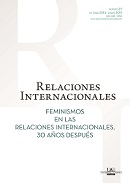Keywords:
Feminisms , Africa, poscolonialism, intersectionality , theoryCopyright (c) 2014 Iker ZIRION LANDALUZE, Leire IDARRAGA ESPEL

This work is licensed under a Creative Commons Attribution-NonCommercial-NoDerivatives 4.0 International License.
Abstract
In International Relations, feminism has generated multiple currents of thought. Different feminisms have emerged in particular places and have been constructed in local terms. In order to underline those contributions arisen from the margins, postcolonial feminisms have challenged the ethnocentric nature of Western feminisms, and also their so-called neutrality, universal-supposed character, and representation and identity creation powers.
In the framework of those postcolonial feminisms, this article focuses on African feminist contributions. Firstly, we cast light on the heterogeneity of the different feminisms proposed by African academics during the last decades –womanism, African womanism, stiwanism, motherism and nego-feminism–. Secondly, we analyze some of the common characteristics of those currents of thought, amongst others; intersectional analysis, self-naming and self-defining necessity; and the claim of equality from a community point of view. All those characteristics may be considered relevant not only for African woman but for globally considered feminism as well.





